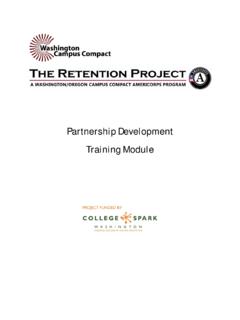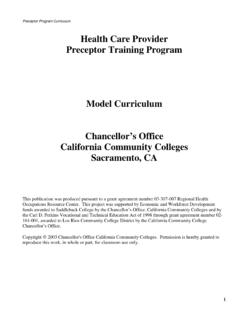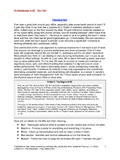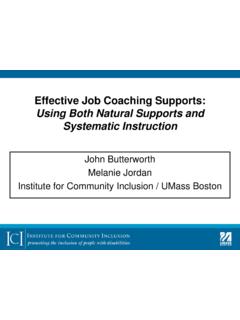Transcription of Mentor Orientation Training …
1 Mentor Orientation Training activities / agenda / roles & expectations (Welcome Readings) (10 min) Activity I. Icebreaker: Introductions (30 minutes) Activity II. roles of a Mentor (30 minutes) Activity III. Overview of Program (40 minutes) Activity IV. Payroll / Timesheet Requirements (15 min.) Activity V. introduction to Blumen Data- Tracking Program (30 min) Activity VI. Campus Resources (10 minutes) Activity VI. Question & Answers-- Wrap up AN ICE BREAKER ACTIVITY ROLE OF A Mentor ACTIVITY TRiO/SSS/WaTEP Mentor Guidelines & Code of Conduct Manual 2010-2011 Central Washington University Katrina Tuttle CONGRATULATIONS AND WELCOME ABOARD!! As a TRiO Mentor , you are about to begin one of life s most rewarding and fulfilling experiences.
2 Your commitment indicates that you believe in others. You recognize the magnitude of the responsibility that you accepted in choosing to work with incoming freshmen and agree to interact /contact appropriately with your mentees according to the highest ethical standards. Most of all, be yourself and enjoy this enriching opportunity. WHAT IS A Mentor ? Mentoring-- which comes from the Greek word meaning enduring is defined as a trusted and sustained relationship between two or more people. With this definition in mind, the TRiO program will group several mentees with one Mentor with a goal of creating enduring and successful relationships. A TRiO Mentor is a special kind of person. A person who has walked through many of the same trials and tribulations in which their mentees have gone through or are about to go through and is a person who has been successful in getting through those endeavors.
3 TRiO mentors are inspirational guides who will help show incoming TRiO freshmen how to become successful in their academic careers and how to achieve their own goals and dreams. Mentor Manual Table of Contents Role of a 5-6 Code of 7 Do s and Don ts .. 8-9 Health and 10 Requirements, expectations & 11 Mentor Training Forms & 16 1. Mentor Evaluation Form 2. Mentee Evaluation Form 3. Session Activity log #1 4. Session Activity log #2 5. Mentor student employment timesheet 6. Mentor requirements checklist (kept in Mentor file) Confidentiality & Contract Agreement .. 17 YOUR ROLE AS A Mentor In the beginning stages of Mentor /mentee matches some of your mentees may appear hesitant and uncertain of this new Mentor relationship.
4 This guarded attitude is simply a manifestation of each of their insecurities about the Mentor relationship and college itself. We know because we have been there ourselves right? Your mentees insecurities will gradually transform to more positive ones, especially once you have helped them become somewhat familiar with you and college life. This Mentor -mentees relationship has an initial phase. This phase is where your mentees are more interested in getting to know how real you are and how much they can trust you. Establish how you can reach your mentees by email, texting, phone, or face to face meetings. Experience proves that emailing or phoning your mentees is usually the best way to make contact. Establish a contact schedule that you will be able commit to.
5 This will build your mentees trust in you, especially by showing them that you re trustworthy and dependable. Please don t try to be teacher, disciplinarian, therapist, or advisor. Your role is just to be a dependable, consistent friend and role model. Present information clearly and give all points of view a fair hearing. Listen carefully and offer possible solutions without passing judgment. Do not criticize or preach. Instead, think of ways to problem solve together without telling them what to do. Never say should have or I told you so to your mentees. Always respect the uniqueness and honor the integrity of your mentees and influence them through constructive feedback. The Mentor empowers the mentees to make the right decisions without actually deciding for the mentee.
6 Identify your mentees interests and take them seriously. Be alert for opportunities and mentoring moments. Always help your mentees explore both positive and negative consequences. Help your mentees set realistic expectations and goals and make achievement fun for them. Remember there is a difference between encouraging and demanding. Your main goal is to encourage and help your mentees to continue on to their 2nd year of college and further. Assist them in making connections between their actions today and reaching their goals and dreams of tomorrow. Encourage them to believe in themselves and to know that it s possible for them to achieve their goals and dreams. After all, you re a perfect example that it is possible, which is inspirational to your mentees.
7 Don t get discourage if some of your mentees are having a difficult time turning their lives around or making improvements. Mentors have a great deal of impact; it s not always immediately evident. Look for simple signs, such as increased attendance, improved grades, increased contact with you, and increased expression of their appreciation. As a friend, you can share information, but know your limitations you are not an advisor. Problems that your mentees may share with you regarding substance abuse, or abuses of any kind, are best handled by the professionals. If you have any concerns, contact the Mentor coordinator immediately. Sometimes you may have involvement with some of your mentees parents. Be supportive of the parents, even when you disagree.
8 Don t ever take sides or make judgments concerning any family conflict or situation. Code of Ethics Rules Guidelines expectations DOs and DON Ts Peer Mentors Collaborate with your Mentor Coordinator and Advisors in the design and adjustment of your mentoring activities . Include the Mentor coordinator on emails regarding questions about and changes in mentoring activities . Coordinate, as needed, with other peer mentors in the program, as well. Engage in professional, ethical mentoring behavior with students that are in line with the philosophy of the TRiO program and the Peer Mentoring roles discussed in this Orientation manual. Be respectful of the expertise and authority of all TRiO staff. Be assertive and take initiative in suggesting ideas, in arranging meetings, or resolving problems related to your peer mentoring role.
9 Engage in regular, responsible record-keeping in logs, surveys, and other paperwork. Provide advance notice to Mentor coordinator, advisors, and students regarding your lateness, illness, etc. and any other issues that may impinge on your peer mentoring services. If you are, or become, a personal friend to a student in your Mentor mentee relationship, you must draw a clear line between friendship and performing in your peer mentoring role (See DON T s). If you witness or you suspect a case of student misconduct --report to Mentor coordinator or advisors immediately. Point out to students any instances of plagiarism; discuss the importance of doing original work, and offer solutions to the problem, such as proper documentation of sources. Peer Mentors should Do NOT criticize your mentees in any way, on any subject matter, whether it is personal, cultural, or academically related.
10 Do NOT discuss any particular mentee s grades or personal information with another student. Student grades are private and confidential between students and instructors. Do NOT comment negatively to mentees about any instructors' teaching methods, assignments, personality, or grading policies. Do not slander staff and programs of this university. Your role should enhance student morale and equip students to overcome challenges and work through misunderstandings. Do NOT provide mentees with the official answers on course content. Refer mentee to the tutoring program in TRiO. Offer assistance and engagement with course material that is more appropriate to your role. Do NOT do mentees learning, thinking, reading, and research for them. Instructors should feel confident that they are evaluating a student's own work on exams and papers.










